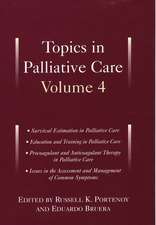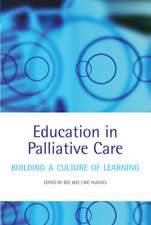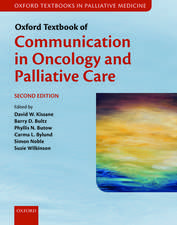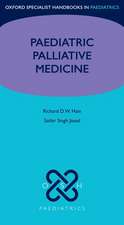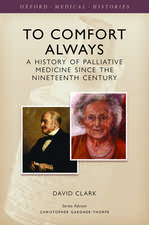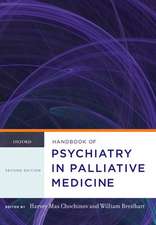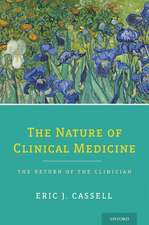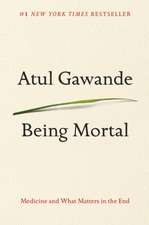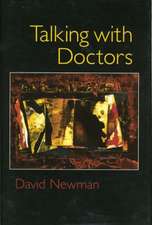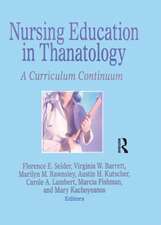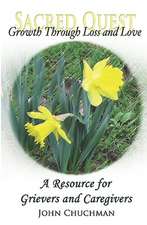Dignity Therapy: Final Words for Final Days
Autor Harvey Max Chochinoven Limba Engleză Hardback – 26 ian 2012
Preț: 535.98 lei
Preț vechi: 671.98 lei
-20% Nou
Puncte Express: 804
Preț estimativ în valută:
102.56€ • 107.08$ • 84.88£
102.56€ • 107.08$ • 84.88£
Carte tipărită la comandă
Livrare economică 25-31 martie
Preluare comenzi: 021 569.72.76
Specificații
ISBN-13: 9780195176216
ISBN-10: 0195176219
Pagini: 224
Dimensiuni: 157 x 236 x 10 mm
Greutate: 0.45 kg
Editura: Oxford University Press
Colecția OUP USA
Locul publicării:New York, United States
ISBN-10: 0195176219
Pagini: 224
Dimensiuni: 157 x 236 x 10 mm
Greutate: 0.45 kg
Editura: Oxford University Press
Colecția OUP USA
Locul publicării:New York, United States
Recenzii
This is truly a remarkable book - it simultaneously brings together the best we know of the science of palliative care with the essence and best of compassionate care.
For all health professionals who find themselves struggling to help patients face the complex process of dying, this book is both a detailed roadmap and an extraordinary guide that dispels the myth that 'there is nothing else they can do.' Most importantly, the book sets a high standard for creating an environment that enables patients' exploration of personhood and suffering and enhances their dignity in the final days of their lives.
[This book] gives us all clear guidance to help our patients and their families to make meaning of their lives in a consistent and standardized manner. Because it will help us to better help our patients and their families, his work is a gift to palliative care clinicians everywhere.
Dignity Therapy is a rich blend of a deep understanding of the existential concerns of the seriously ill and dying, and an incredibly practical resource for clinicians.
This is not your usual medical text - it is written with profound sensitivity, humanity, and wisdom that is both inspiring and practical.
In this elegant book, Harvey Chochinov shows how the interrelatedness of one human being with another affects an individual's intrinsic sense of dignity, and he examines the implications of this on the care environment. Every palliative care service will find this book enriching and will look with refreshed eyes on the work of providing care to others.
[It] offers unique insight into the process of psychological dying and the opportunity for growth. I recommend it to anyone who is working in the helping professions and has the unique opportunity to be present as individuals create their own last chapter.
This book is valuable to clinicians from all settings and fields, those involved in medical and nursing education, and those undertaking research to improve patient and family experience and care.
Dr. Chochinov's Dignity Therapy provides a practical way to implement one of the essential elements of any healthcare system and any relationship between a clinician or caregiver and patient who is seriously ill honouring the dignity of each and every individual. His book provides practical, evidence-based, yet sacred, interventions that allow for healing in the midst of suffering.
Whether you are a professional who, like me, works in palliative care or in another setting, I recommend Chochinov's book as one to put on your reading list for the coming year. s
Dignity Therapy is an engaging read distinguished by its depth of insight and vibrant perspective. s
Dignity Therapy: Final Words for Final Days is a comprehensive, well-written, and engaging book, which provides a clear background and implementation guide for Dignity Therapy. It would probably be most useful for palliative care and hospice providers and for those of us in palliative care who are in a position to either implement or advocate for the implementation of a Dignity Therapy program.
What I like about it particularly is that it presents a subtle and powerful argument against euthanasia without in any way being overtly religious.
For all health professionals who find themselves struggling to help patients face the complex process of dying, this book is both a detailed roadmap and an extraordinary guide that dispels the myth that 'there is nothing else they can do.' Most importantly, the book sets a high standard for creating an environment that enables patients' exploration of personhood and suffering and enhances their dignity in the final days of their lives.
[This book] gives us all clear guidance to help our patients and their families to make meaning of their lives in a consistent and standardized manner. Because it will help us to better help our patients and their families, his work is a gift to palliative care clinicians everywhere.
Dignity Therapy is a rich blend of a deep understanding of the existential concerns of the seriously ill and dying, and an incredibly practical resource for clinicians.
This is not your usual medical text - it is written with profound sensitivity, humanity, and wisdom that is both inspiring and practical.
In this elegant book, Harvey Chochinov shows how the interrelatedness of one human being with another affects an individual's intrinsic sense of dignity, and he examines the implications of this on the care environment. Every palliative care service will find this book enriching and will look with refreshed eyes on the work of providing care to others.
[It] offers unique insight into the process of psychological dying and the opportunity for growth. I recommend it to anyone who is working in the helping professions and has the unique opportunity to be present as individuals create their own last chapter.
This book is valuable to clinicians from all settings and fields, those involved in medical and nursing education, and those undertaking research to improve patient and family experience and care.
Dr. Chochinov's Dignity Therapy provides a practical way to implement one of the essential elements of any healthcare system and any relationship between a clinician or caregiver and patient who is seriously ill honouring the dignity of each and every individual. His book provides practical, evidence-based, yet sacred, interventions that allow for healing in the midst of suffering.
Whether you are a professional who, like me, works in palliative care or in another setting, I recommend Chochinov's book as one to put on your reading list for the coming year. s
Dignity Therapy is an engaging read distinguished by its depth of insight and vibrant perspective. s
Dignity Therapy: Final Words for Final Days is a comprehensive, well-written, and engaging book, which provides a clear background and implementation guide for Dignity Therapy. It would probably be most useful for palliative care and hospice providers and for those of us in palliative care who are in a position to either implement or advocate for the implementation of a Dignity Therapy program.
What I like about it particularly is that it presents a subtle and powerful argument against euthanasia without in any way being overtly religious.
Notă biografică
Dr. Harvey Max Chochinov is an international leader in palliative care. He is Distinguished Professor of Psychiatry at the University of Manitoba and Director of the Manitoba Palliative Care Research Unit at CancerCare Manitoba. His seminal publications on psychosocial issues in advanced illness have helped define core competencies and standards of palliative end-of-life care. Dr. Chochinov has also been a guest lecturer in many major academic institutions around the world. He has been lauded for his contributions to palliative care, with awards and recognitions coming from the International Psycho-oncology Society, the Canadian Association of Psychosocial Oncology, the Canadian Cancer Society, the Canadian Psychiatric Association, the Academy of Psychosomatic Medicine, and the American Association of Hospice and Palliative Medicine. He is Fellow of the Royal Society of Canada and the Canadian Academy of Health Sciences.

